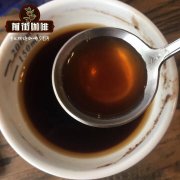How about coffee in Rwanda _ cultivation of coffee beans in Rwanda _ introduction to the method of coffee treatment in Rwanda

Professional coffee knowledge exchange more coffee bean information please follow the coffee workshop (Wechat official account cafe_style)
Rwanda is bordered by Tanzania to the east, Burundi to the south, Zaire to the west and northwest, and Rwanda to the north, with six volcanoes, 23 lakes and numerous rivers. It is a landlocked African country with remarkable ecological diversity and beautiful natural scenery. There is the title of "the country of a thousand hills".
Rwanda is the only country in the world that can fully enjoy the harmony between soil elevation and climate.
Fertile acid volcanic soil,
A high altitude of 1500-2000 meters
Rainfall 9-2200
The suitable cool temperature is 18-22 °.
● government support
Fortunately, since 2000, the Government of Rwanda has taken positive measures to set up coffee production cooperatives and water washing stations in various places to provide technical guidance and financial support to farmers.
Coupled with the assistance of the United States Agency for International Development (USAID) in the development of local farmers' cooperatives, Rwandan coffee will not only gradually restore production, but also many of them are good things! For example, the Ambarkanda Cooperative and the neighboring Musasa Co-op. Are good examples.
The Ambarkanda Cooperative, founded in 2005, is located about 30 kilometers northwest of the capital Kigali and has two washing plants. There are 1961 coffee growers and 46 per cent of the members of the cooperative are women.
This is very different in Luanda's economic activity and coffee industry. The group of women farmers in the cooperative is called "hingakawa", which means "Coffee for our growth". This unique group is made up of about 150 women who are very careful in the selection and handling of coffee, fully demonstrating that women can also lead and produce high-quality coffee.
They reinvest the profits from selling high-quality coffee (about two containers a year) into their families and surrounding coffee cooperatives.
They use the money to buy goats for milk production, then sell the milk locally, and use the profits to invest in coffee production and train other female growers involved in coffee production.
They also help 80-100 students pay tuition fees and provide health care for each member of the community, while investing in other activities related to women (such as sewing services, which are seen by women as another source of income).
They plan to use the extra income from the sale of high-quality coffee to continue to expand the size of the school and to increase investment in coffee farms.
● strengthens late-stage management
With the outbreak of the civil war in Rwanda, thousands of widows find that they can only support their families on their own.
Within the cooperative, there is a special female planting team called "hingakawa", which means "Let's grow coffee". Made up of about 150 female coffee farmers
They carefully select and process their own coffee beans, and the female members of the Ambarkanda Cooperative are responsible for overseeing all operational processes of the farm, from production to sales.
From on-site baking and cup testing, to the use of income for tuition fees and investment in community building, to the transformation of pure organic processing methods
They carefully select and process their own curry beans to prove that sex can also achieve the quality of coffee production. This is the first women's coffee shop production project (Cafe Femenino Program) born on the African continent in 2008.
● 48 hours long fermentation
Rwandan coffee uses the art of long fermentation to ensure the quality of coffee, which is also used by other cooperatives.
The cooperative is committed to leading farmers to produce high-quality berries that are rich and complete in organic cultivation, and soak for 48 hours in the treatment plant for more than twice the normal washing time. Add features to raw beans.
When supplemented by scaffolding exposure, a large amount of manpower is invested to pick out the bad beans that may be caused by soaking for a long time or other reasons.
● on-site baking and cup testing
In order to effectively avoid the "potato effect" in the local community has unique resources for baking and cup testing, they make organic methods. As a result, technical and leadership training has also been received from the Government of Rwanda and other development agencies.
Coffee production in Rwanda increases year after year. For three consecutive years in 2010, 2011 and 2012, the Ambarkanda Cooperative is on the list of COE in Rwanda, which is the most indicative affirmation!
The significance of ● coffee to the people of Rwanda
Coffee has a different meaning for everyone. It may be a sense of ritual, or it may represent the pursuit of quality.
They hope to increase coffee exports to promote the country's economic development, and they also hope that the two major tribes, the Hutu and the Tutsi, who once killed each other, will work together to grow coffee, eliminate gratitude and hatred, and jointly build a better tomorrow.
Coffee places the hope of the people of Rwanda.
Coffee is hope.
Qianjie coffee: Guangzhou bakery, the store is small but a variety of beans, you can find a variety of unknown beans, but also provide online store services. Https://shop104210103.taobao.com
Important Notice :
前街咖啡 FrontStreet Coffee has moved to new addredd:
FrontStreet Coffee Address: 315,Donghua East Road,GuangZhou
Tel:020 38364473
- Prev

What does the Rwandan coffee taste good? what does the Rwandan coffee potato effect mean?
Professional coffee knowledge exchange more coffee bean information please follow the coffee workshop (Wechat official account cafe_style) Coffee farming is a traditional industry in Rwanda. Rwanda is one of the least visited countries in the world, with 90% mainly agriculture and animal husbandry. In 1904, German missionaries introduced bourbon trees from Guatemala and began to export them in 1917. Through the colonial trade policy,
- Next

Where to buy coffee beans in Rwanda _ present situation of coffee production in Rwanda _ is the price of coffee beans expensive in Rwanda
Professional coffee knowledge exchange for more information on coffee beans follow the coffee workshop (Wechat official account cafe_style) according to the President of the Rwandan Coffee processing and Export Association (CEPAR), coffee is a key factor in achieving sustainable development in the country. CEPAR was founded in 2010 to support coffee production through the establishment of a fertilizer fund, originally by the National Agricultural Export Commission.
Related
- Detailed explanation of Jadeite planting Land in Panamanian Jadeite Manor introduction to the grading system of Jadeite competitive bidding, Red bid, Green bid and Rose Summer
- Story of Coffee planting in Brenka region of Costa Rica Stonehenge Manor anaerobic heavy honey treatment of flavor mouth
- What's on the barrel of Blue Mountain Coffee beans?
- Can American coffee also pull flowers? How to use hot American style to pull out a good-looking pattern?
- Can you make a cold extract with coffee beans? What is the right proportion for cold-extracted coffee formula?
- Indonesian PWN Gold Mandrine Coffee Origin Features Flavor How to Chong? Mandolin coffee is American.
- A brief introduction to the flavor characteristics of Brazilian yellow bourbon coffee beans
- What is the effect of different water quality on the flavor of cold-extracted coffee? What kind of water is best for brewing coffee?
- Why do you think of Rose Summer whenever you mention Panamanian coffee?
- Introduction to the characteristics of authentic blue mountain coffee bean producing areas? What is the CIB Coffee Authority in Jamaica?

